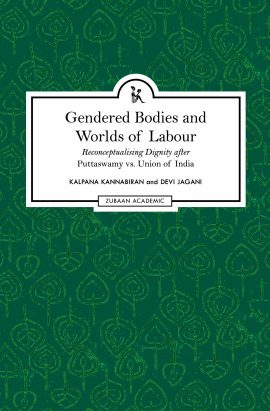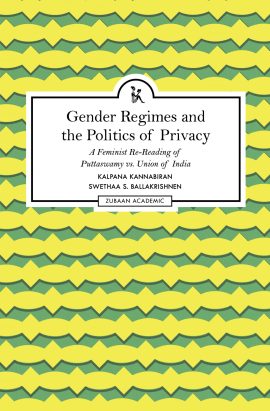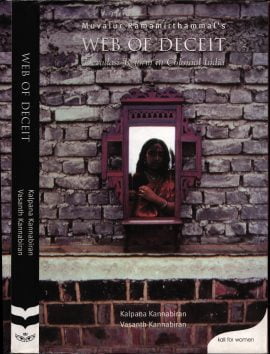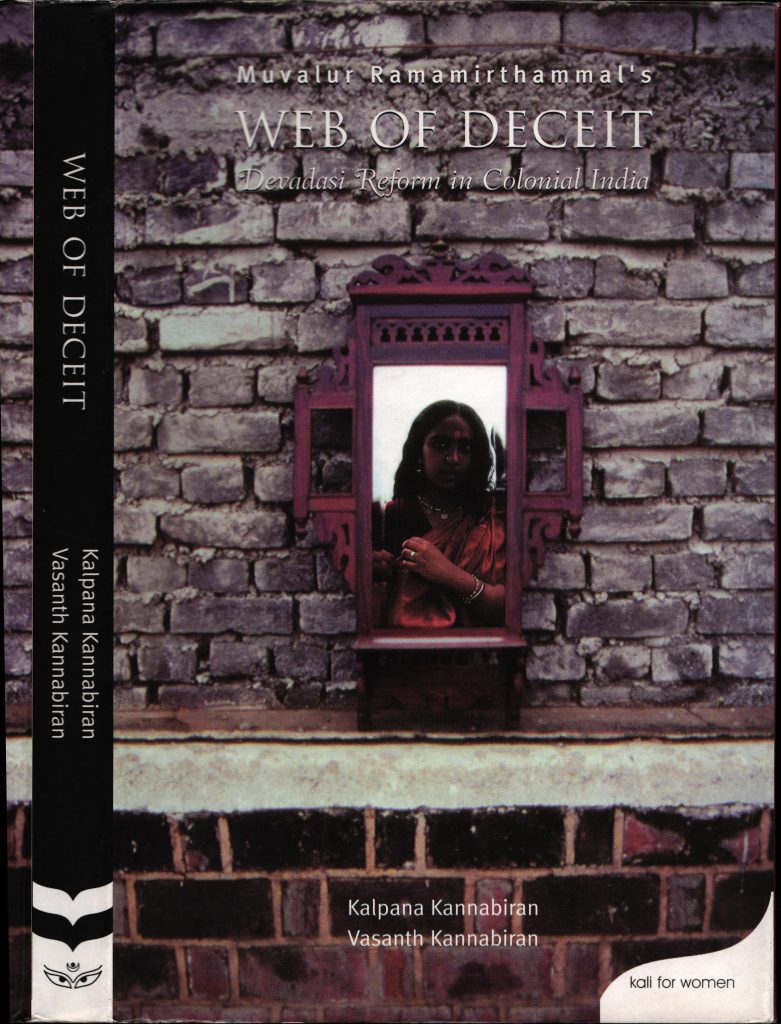No products in the cart.
Return To Shop
Log in / Sign in
Login
Register
Gendered Bodies and Worlds of Labour
₹ 495 – ₹ 695Price range: ₹ 495 through ₹ 695Select format This product has multiple variants. The options may be chosen on the product pageGender Regimes and the Politics of Privacy: A Feminist Re-Reading of Puttaswamy vs. Union of India
₹ 550 – ₹ 795Price range: ₹ 550 through ₹ 795Select format This product has multiple variants. The options may be chosen on the product pageWeb of Deceit: Devadasi Reform in Colonial India
₹ 295 – ₹ 300Price range: ₹ 295 through ₹ 300Select format This product has multiple variants. The options may be chosen on the product pageThis book presents a brilliant reading of the unanimous decision of the nine-judge bench of the Supreme Court of India in the case of Justice KS Puttaswamy (Retd.) and Another vs. Union of India and Others (‘Puttaswamy’). The 2017 judgment protects the right to privacy as a fundamental right, and guarantees the right to life with dignity, the right to personal liberty and the right to move the court against unconstitutional actions by the state.
The authors examine the implications of Puttaswamy to understanding labouring bodies (in their multiplicity) and their worlds of work. They explore the gendered dimensions of the right to privacy and its relation to labour rights, sexual safety, and bodily integrity, offering a dynamic interpretation of the right to privacy and related rights of dignity, liberty, and equality. Using the Constitution, Kannabiran and Jagani anchor labour rights in Puttaswamy to advance claims-making and emphasise collective struggles for justice and resistance to oppression as the most productive route to conceptualising an idea of justice in the realms of labour.
Further, the monograph emphasises the need to popularise constitutional conversations beyond the courts and holds valuable lessons for women’s and labour rights movements. Drawing from a range of scholarly works and case law to offer a fresh understanding of labour that does not rely on gender binaries, the authors initiate conversations on human dignity, intersectional discrimination, and resistance to reinstating labouring bodies in workplaces. This work opens up new opportunities for feminist and labour studies scholars, trade unions, and courts to explore interdisciplinary intersections and frame claims for more just, fair, and equal working environments.
Kalpana Kannabiran and Devi Jagani’s work inspires both hope and anxiety, as they challenge us to build intellectual and on-ground solidarities that cross disciplinary boundaries, to support those who are most marginalised.
— Navsharan Singh, independent researcher, writer, and activist
______________________________________________________________________________________
DEVI JAGANI is an independent legal researcher and lawyer. She graduated from the Institute of Law, Nirma University in 2018 with a BA, LLB (Hons.) and from the University of Oxford in 2019 with a Bachelor of Civil Law (BCL). Her areas of interest include jurisprudence, constitutional law, criminal law, gender studies, human rights, and discrimination law.
KALPANA KANNABIRAN is a sociologist and legal researcher based in Hyderabad and is currently Distinguished Professor at the Council for Social Development, New Delhi. She has published widely in sociology, gender studies, human rights, and law with a focus on India. She is the co-author of Gender Regimes and the Politics of Privacy: A Feminist Re-Reading of Puttaswamy vs. Union of India (Zubaan 2021).
In 2017 an all-male nine-judge bench of the Indian Supreme Court delivered the landmark Justice K.S. Puttaswamy & Ors v. Union of India judgment on privacy. In this book, the authors look at the embodiment of privacy in the judgment to examine the ways in which the bench articulated the question of gender. They argue that while Puttaswamy has been central in clarifying the extent of (and extensions to) the right to privacy as a fundamental right, the discourse on this has long existed in India — in various gendered social movements, policy-making around women’s rights, feminist historiography, and discourses on the family, sexual rights, autonomy and choice (in and outside courts), dignity, and critiques of surveillance — and provides an important context within which the judgment becomes especially relevant.
The authors unpack the underlying logics of the right to privacy within the default prism of the notional identity of the normative household and offer an entry point to re-read existing jurisprudence on rape, sexual assault, sexual harassment, atrocity, and sexual violence and humiliation under conditions of mass violence. They suggest a springboard for the possibility of theorizing personhood within the right to privacy, arguing that while the judgment sets up radical precedent on the questions of sexual minorities, it remains trapped in a reductionist reading of the female body within heteronormativity.
KALPANA KANNABIRAN works at the intersections of sociology, law, and gender studies. A co-founder of Asmita Resource Centre for Women, Secunderabad, she has taught at NALSAR University of Law, Hyderabad (1999-2009), and was a regional director at the Council for Social Development, Hyderabad (2011-2021). She is the author of Tools of Justice: Non-Discrimination and the Indian Constitution (2012) and editor of Violence Studies (2016), among others.
SWETHAA S. BALLAKRISHNEN is an assistant professor of Law (and by courtesy, Sociology, Asian American Studies, and Criminology, Law and Society) at the University of California, Irvine. Their research, teaching, and service are primarily focused on law’s connection to actors and relationships at the periphery, usually around identities, queers, and souths. Their writings have appeared in several journals, and their books include Accidental Feminism (2021) and Invisible Institutionalisms (co-edited, 2021).
Dasigal Mosavalai (Web of Deceit) propagates the abolition of the devadasi system and seeks to reclaim youth from the temptations and immorality of the dasi. And yet in the very process of articulating the demand, the novel uncovers different layers of resistance and acquiescence to this demand. It is the story of lived lives, of political aspirations, of wealth, and of love in its several forms (maternal, paternal, conjugal, fraternal, sororal, erotic, for instance), of sexual desire – female and male. It documents the shift from one historical epoch to another using the space of the story to map these changes.
Born in 1883, in an Isai Vellalar family in Muvalur village of Thanjavur district, Ramamirthammal began her political career in the Congress, and went on to become an active Self Respecter and a passionate abolitionist. While supporting Muthulakshmi Reddi’s measures for legal reform, she struck a clearly different note in her articulation of the root cause of the system, locating herself firmly within the ideology of the Self Respect Movement.
In the introduction, Kalpana Kannabiran and Vasanth Kannabiran frame the novel in the large intersecting economies of the state, land, reform, caste, culture, morality and conjugality in a period of transition. Through a feminist analysis of judicial discourse, constructions of gender and family, and the politics of citizenship that contain the complex interconnections between abolition, anti abolition, self respect, nationalism and the performing arts, they provide insights with an intricacy of detail that deepens an understanding of the novel.
KALPANA KANNABIRAN & VASANTH KANNABIRAN are founder members of Asmita Resource Centre for Women Secunderabad and were part of Stree Shakti Sanghatana in the early 1980s.
Vasanth Kannabiran is a creative writer, poet, and translator. Among her books are A Grief to Bury: Memories of Love, Work and Loss (2011) and Taken at the Flood: A Political Memoir (2020).
Kalpana Kannabiran is a sociologist and legal researcher. She has taught at NALSAR University of Law and is Director of Council for Social Development, Hyderabad. Among her publications are Tools of Justice: Non Discrimination and the Indian Constitution (2012), Law, Justice and Human Rights (2021 forthcoming). She is co-author of Gender Regimes and the Politics of Privacy (2021 forthcoming).
Contact Us
© Zubaan 2019. Site Design by Avinash Kuduvalli.
Payments on this site are handled by CCAvenue.






